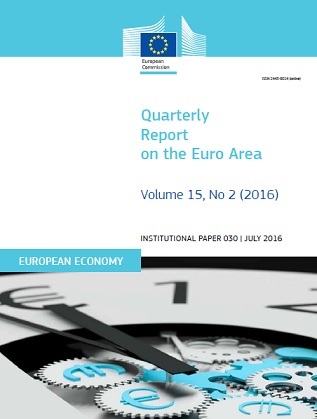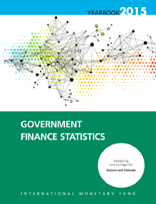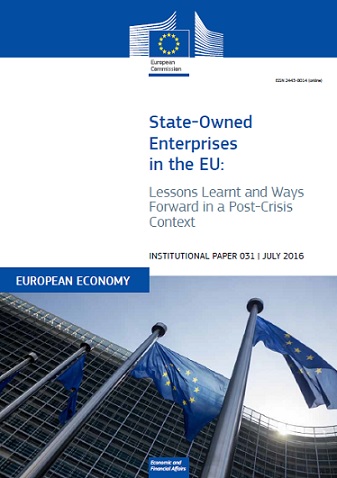Lemoine, Matthieu, Lindé, Jesper, (2016), “Fiscal Consolidation Under Imperfect Credibility”, Centre for Economic Policy Research, Ιούλιος This paper examines the effects of expenditure-based fiscal consolidation when credibility as to whether the cuts will be long-lasting is imperfect. We contrast the impact limited credibility has when the consolidating country has the means to tailor monetary policy to its own needs, with the impact when the country is a small member of a …Read More
Secular stagnation in the open economies: How it spreads, how it can be cured
Eggertsson, Gauti B, Summers, Lawrence H., (2016), “Secular stagnation in the open economies: How it spreads, how it can be cured”, Voxeu, 22 Ιουλίου The secular stagnation hypothesis suggests that low interest rates may be the new normal in years to come. This column argues that this prospect should not only lead to a major rethinking of policy from the perspective of individual economies, but also a major rethinking about monetary …Read More
Quarterly Report on the Euro Area
European Commission, (2016), “Quarterly Report on the Euro Area”, Vol.15, No.2, Institutional Paper 030, Ιούλιος According to the European Commission’s latest forecast, published in May 2016, the economic recovery in the euro area is expected to continue at a fairly modest pace, especially when compared with precrisis standards. Underwhelming growth is mainly supported by internal demand and some tailwinds, in particular very accommodative monetary policies, supportive fiscal policies, low oil prices …Read More
The impact of the crisis on fiscal convergence in the EU: the early signs
Censoloa, Roberto, Colombo, Caterina, (2016), “The impact of the crisis on fiscal convergence in the EU: the early signs”, Journal of European Integration, 29 Απριλίου This article investigates the early signs of the impact of the financial crisis on fiscal convergence within the EU. Over the 2004–2012 period, we offer a comprehensive picture of the convergence pattern by considering the key fiscal aggregates and the main economic and functional components of total …Read More
The Problem that Wasn’t: Coordination Failures in Sovereign Debt Restructurings
Bi, Ran, Chamon, Marcos, Zettelmeyer, Jeromin, (2016), “The Problem that Wasn’t: Coordination Failures in Sovereign Debt Restructurings”, IMF Economic Review, 28 Ιουνίου Contrary to widespread expectation, emerging market debt renegotiations in the era of bond finance have generally been quick and involved little litigation. This paper presents a model that rationalizes some of the initial fears and offers two interpretations for why they did not come true. First, when debt exchange offers …Read More
Creditor participation clauses: Making orderly sovereign debt restructuring feasible in the Eurozone
Andritzky, Jochen, Feld, Lars P, Schmidt, Christoph M, Schnabel, Isabel, Wieland, Volker, (2016), “Creditor participation clauses: Making orderly sovereign debt restructuring feasible in the Eurozone”, Voxeu, 21 Ιουλίου To make the no-bailout clause credible and to enhance the effectiveness of crisis assistance, private creditors should contribute to crisis resolution in the Eurozone. This column proposes a mechanism to allow for orderly restructuring of sovereign debt as part of ESM programmes. If debt exceeds certain thresholds, …Read More
An inflection point in European Union studies?
Young, Alasdair R., (2016), “An inflection point in European Union studies?”, Journal of European Public Policy, 8 Ιουνίου This contribution introduces a selection of the best papers presented at the 2015 European Union Studies Association’s biennial conference. It uses these papers as a jumping off point to consider whether European Union (EU) studies suffers the same ‘gap’ with real-world problems that is seen to afflict some portions of the academy and to …Read More
The ECB At A Dangerous Crossroad As Berlin Endangers QE
Minenna, Marcello, (2016), “The ECB At A Dangerous Crossroad As Berlin Endangers QE”, Social Europe, 20 Ιουλίου In the stormy aftermaths of Brexit, with Eurozone stock markets losing 8% on average and Sterling crashing, government bonds have remained substantially unperturbed. The ECB shield, in the form of the €80 billion of Public Sector Purchase Program (PSPP) monthly asset purchases, has been remarkably effective and has reduced volatility to the bare minimum. …Read More
Government Finance Statistics Yearbook 2015
International Monetary Fund, (2016), “Government Finance Statistics Yearbook 2015”, IMF, Ιούνιος This annual publication provides detailed data on transactions in revenue, expense, net acquisition of assets and liabilities, other economic flows, and balances of assets and liabilities of general government and its subsectors. The data are compiled according to the framework of the 2014 Government Finance Statistics Manual, which provides for several summary measures of government fiscal performance. Σχετικές …Read More
State-Owned Enterprises in the EU: Lessons Learnt and Ways Forward in a Post-Crisis Context
European Commission, (2016), “State-Owned Enterprises in the EU: Lessons Learnt and Ways Forward in a Post-Crisis Context”, European Commission, Institutional Paper 031, Ιούλιος Recent experience has shown that State-Owned Enterprises (SOEs) can be an important source of concerns in at least three areas: market functioning, public finances and financial stability. Given their economic role, it is important to develop a comprehensive EU-wide overview on SOEs in order to consistently explore …Read More







